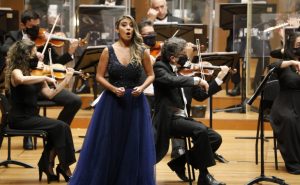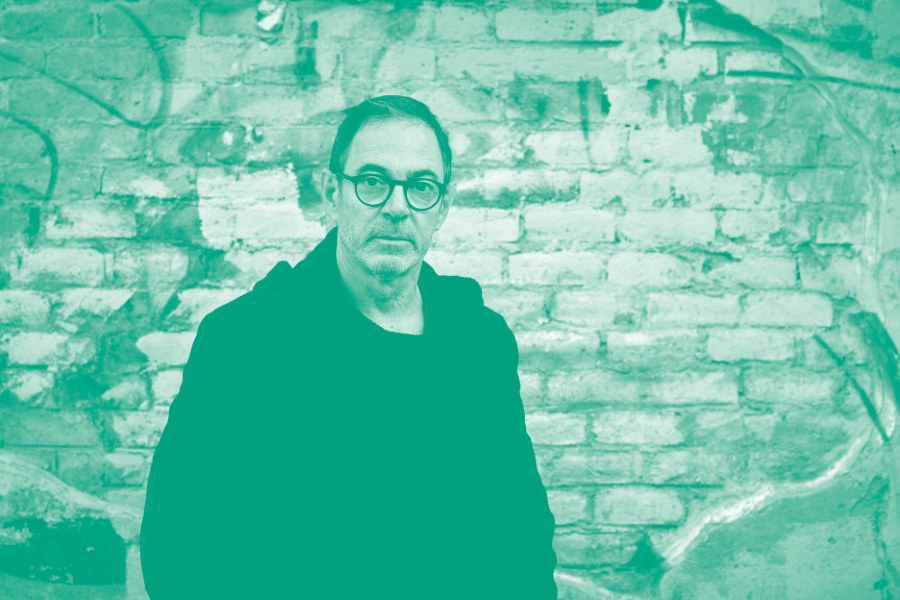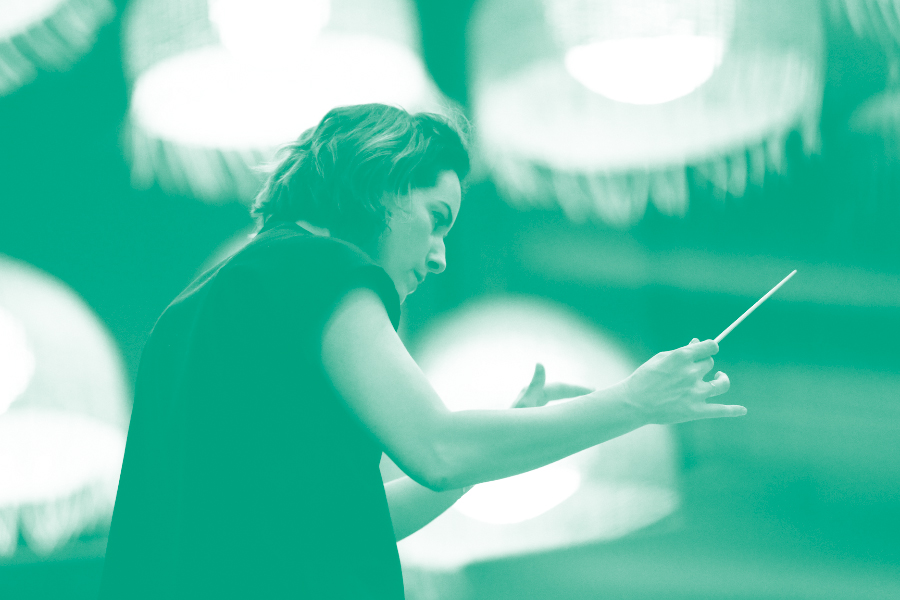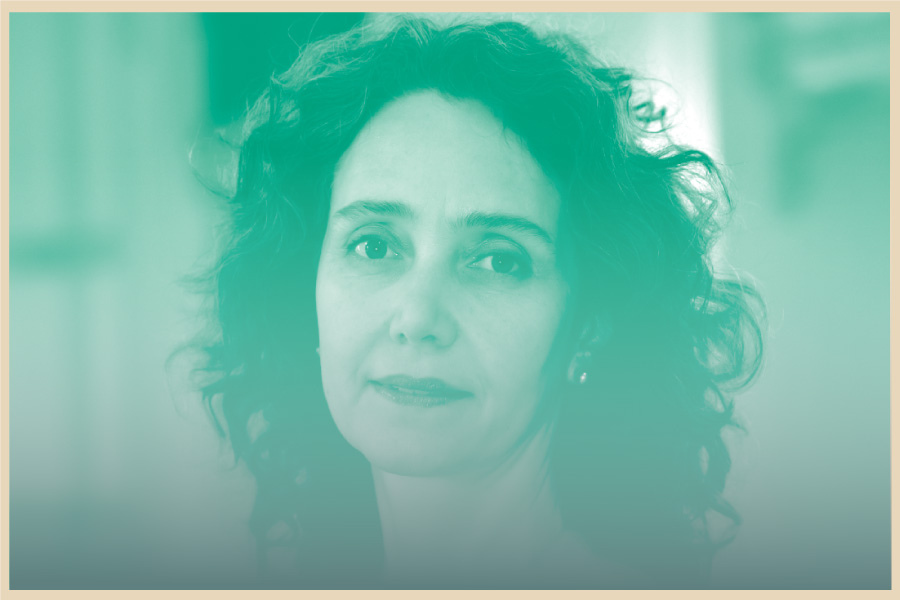René Coronado: “Creo que la fórmula es trabajar con honestidad, humildad y definitivamente con un enorme deseo por trabajar en pro de los demás.”

Conversamos con René Coronado, director ejecutivo de la Ópera de Colombia, en “de ópera y otras hierbas”, sobre el aniversario número 45 de la compañía, los desafíos que propone este nuevo año, el legado de Gloria Zea y el panorama actual que vive la escena artística de su país.
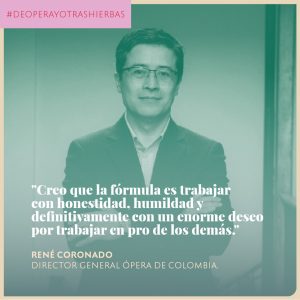
¿Cómo se vienen las celebraciones de los 45 años de la Ópera de Colombia?
Comenzamos con la transmisión de nuestras más recientes coproducciones con el Teatro Mayor Julio Mario Santo Domingo por el canal de televisión pública Canal Capital. Esto sucederá los lunes festivos (de acuerdo con el calendario de Colombia), entre los meses de mayo y agosto. Luego haremos el lanzamiento de la segunda fase de la interactividad www.miuniversopera.com, la plataforma dirigida a niños y adolescentes, quienes ahora se divertirán con una gran producción audiovisual de El barbero de Sevilla. Para rematar esta celebración en el mes de septiembre haremos el lanzamiento del libro digital “45 años de la Ópera de Colombia”, una publicación que estará disponible de manera gratuita; y de cierre, un concierto en el Teatro Cafam de Bogotá, con las jóvenes promesas del canto lírico colombiano que ya gozan de proyección internacional.
¿Dentro de la programación especial por el aniversario, cuál espectáculo destacarías?
Cada componente de esta celebración ha sido definido con toda la especial atención que merece una celebración de este nivel, claro está, en medio de la pandemia, una situación tan compleja para todos. Quiero destacar el concierto de cierre con los jóvenes cantantes colombianos porque pretendemos rematar con un mensaje de esperanza y fe en un futuro mejor, con la seguridad que este complejo momento para todos será superado.
¿Cómo ha sido para ustedes enfrentarse a nuevas formas de mostrar los espectáculos, ahora a través de la pantalla?
Era un desafío que teníamos pendiente afrontar desde años atrás y hoy ante las restricciones para que el público pueda asistir masivamente al teatro se convierte en una realidad con que se debe afrontar. El año pasado nos atrevimos junto con el Teatro Mayor a producir y grabar en video la ópera Gianni Schicchi de G. Puccini. Luego la compartimos con el público en la plataforma Teatro Digital con un éxito arrollador, en tan sólo una semana fue vista por más de 250.000 personas. Debemos sumar a esto la creación de la plataforma interactiva www.miuniversopera.com, que nos ha permitido desarrollar una alianza estratégica con veinte colegios de primaria y secundaria de la ciudad de Bogotá. Esta interactividad se ha convertido en vital herramienta pedagógica a la hora de hablar de música y ópera en el colegio.
¿Cómo se han enfrentado a la pandemia?
Como a todos, esto nos tomó por sorpresa, pero gracias al trabajo solidario con nuestros aliados estratégicos y el Gobierno Nacional, hemos continuado con nuestras actividades, que por lo pronto compartimos con el público de manera no presencial.
¿Qué desafíos vive la escena musical en Colombia hoy en día?
Se vive una situación realmente difícil. La mayoría de los agentes del sector viven en la informalidad y las estrategias de apoyo implementadas no son suficientes. A esto le debemos sumar el desafortunado abandono de la empresa privada que hoy argumenta encontrarse en tan dramática situación económica que no puede continuar con sus apoyos al sector cultural. En frente tenemos grandes desafíos: por parte del Gobierno Nacional fortalecer las medidas implementadas, conseguir la atención de la empresa privada que debe entender su vital importancia en el apoyo al sector y un público que esperamos se solidarice con quienes siempre han estado ahí para nutrir e inspirar sus vidas, hoy necesitamos de su apoyo más que nunca.
¿Qué destacas de la escena musical y cultural de Colombia hoy en día?
Una inmensa capacidad de resiliencia pero hoy necesita entender que si no actuamos unidos será mucho más complicado para todos.
¿Cómo ha sido mantener vivo el legado que dejó Gloria Zea?
Gloria Zea trabajó por el arte y la cultura en Colombia por más de cincuenta año. Sin duda su legado ha dejado huella indeleble en la historia del arte nacional. El reto es enorme y estos dos últimos años le agregan un ingrediente externo que lo hace mucho más desafiante. Creo que la fórmula es trabajar con honestidad, humildad y definitivamente con un enorme deseo por trabajar en pro de los demás.

¿Cuál crees tú, que es el mayor aporte que hace la Ópera de Colombia al país?
Sin duda alguna la Ópera de Colombia es la más importante compañía lírica del país en el último siglo. Hemos sido protagonistas indiscutibles de la historia de este bello arte en Colombia. Esta compañía ha sido la plataforma para más de dos centenares de cantantes colombianos que luego han logrado forjar importantes carreras profesionales.
¿Cuáles han sido sus mayores logros durante este año?
El último año logramos confirmar un pálpito alrededor de la pregunta ¿cómo hacemos para que más colombianos conozcan este género? Y la respuesta está en que si no contamos con los escenarios apropiados a nivel nacional, si es retador circular producciones de ópera por sus costos de producción y desafíos artísticos y técnicos, pues pudimos comprobar que podemos llevar este bello arte hasta la comodidad de sus hogares. Si bien la ópera se disfruta en todo su esplendor en vivo, las pantallas de los televisores, computadores y cualquier tipo de dispositivo móvil nos da la posibilidad de tener un primer contacto y seguro muchos de los que hoy nos ven por primera vez de manera virtual, seguro a la menor oportunidad asistirán a la sala del teatro.
¿Cuáles son las proyecciones artísticas de la Ópera de Colombia para el próximo año?
Consolidaremos nuestras actividades de carácter no presencial y volveremos con importantes producciones a las salas de los teatros. Nos preocuparemos por no sólo pensar en los títulos de repertorio, sino también ser una ventana para los nuevos creadores y para aquellos que quieran compartir una nueva mirada a un género que merece constante renovación. Desde ya estamos trabajando bajo la hipótesis de un año 2022 con relativa normalidad.
